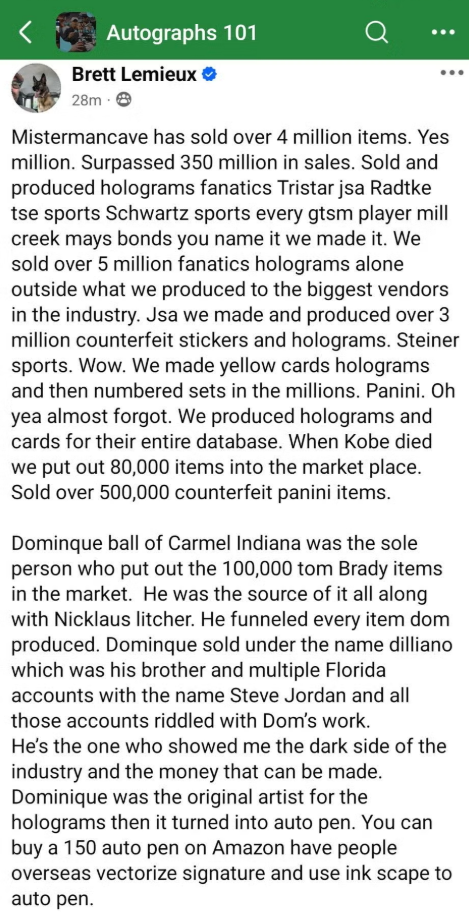In a tale straight out of a gripping crime novel, the world of sports memorabilia has been thrown into chaos, as one of its well-regarded figures is tied to one of the largest counterfeit operations of its kind. The quiet town of Westfield, Indiana, found itself at the epicenter of a scandal that has sent shockwaves across the globe and left collectors and industry insiders in disbelief.
Brett Lemieux, a name previously associated with trust and integrity in the sports memorabilia circle, is now linked with a scandal that threatens to rewrite the history of sports collectibles. The 45-year-old autograph dealer, known for his expansive online jersey business under the name Mister Mancave, was found dead as authorities executed a search warrant. Westfield police reported that Lemieux died of a self-inflicted gunshot wound, leaving not just a void but a Pandora’s box of fraud that may have reverberations for years.
Before his death, a shocking confession allegedly penned by Lemieux appeared in the “Autographs 101” Facebook group. In it, he admitted to heading a counterfeit operation responsible for releasing over four million fake sports memorabilia items into the market. If true, this operation duplicitously inflated sales to the tune of $350 million—a claim that has left the autograph community reeling and questioning the authenticity of countless collectibles.
At the heart of Lemieux’s operation was a masterful tactic: the forgery of hologram stickers from reputable authentication companies like Panini, Fanatics, Tri-Star, and James Spence Authentics. These holograms are designed to assure collectors of an item’s authenticity. Post Kobe Bryant’s tragic passing in 2020, Lemieux purportedly capitalized on the opportunity, flooding the market with 80,000 forged items bearing seemingly legitimate hologram seals. This vast proliferation of counterfeits cast a shadow not just over basketball collectibles but extended its dark reach across other sports as well.
Intriguingly, Lemieux’s business, predominantly advertised online with an address in Columbus, Ohio, revealed no tangible existence of a storefront. His incorporation history in Indiana, documented twice between 2018 and 2023, served as a breadcrumb trail leading investigators and industry leaders down rabbit holes of suspicion.
Despite industry skepticism, there’s no overlooking the disruption caused by Lemieux’s alleged deception. The market now faces an arduous journey to regain trust. Fanatics, a stalwart in memorabilia authentication, has reportedly revamped its hologram technology to thwart counterfeiters while engaging law enforcement and consulting fraud experts, including ex-FBI agents, to restore collector confidence.
Yet, while some competitors have dismissed claims of $350 million in sales as hyperbolic—deeming it “impossible”—the profound impact of these forgeries cannot be diminished. Steve Grad, an established figure in autograph authentication, acknowledges the sophistication of forgery techniques today, including the use of autopen machines, which complicate the identification of false items. The maturity of this operation illustrates the growing sophistication of counterfeiters that the market must continue to combat.
Despite being an unwelcome surprise to the broader community, whispers of Lemieux’s actions had already stirred among some insiders. Certain dealers expressed suspicion over his inventory, questioning the origins of autographs from athletes who had long ceased public signings. The drama intensifies further as Lemieux’s “manifesto” implicated notable figures like Indiana dealer Dominique Ball and Wisconsin’s Nickolas Litscher. The latter has publicly denied any wrongdoing, hinting at legal steps to clear his tainted name.
The investigation widens as authorities suspect Lemieux’s network operated a web of businesses under various guises, names such as Ultimate Sports, Athletes One, Signature Dog, and All-American Authentics being among the potential aliases. The sheer scale and complexity of this operation underscore the challenges faced by collectors and professionals working to preserve the integrity of the sports memorabilia market.
In the wake of this scandal, collectors are left scrutinizing their treasured items, searching for signs of authenticity, and grappling with uncertainty over past purchases. This debacle serves as a stark reminder of the necessity for vigilance and adaptation within the collectibles market. As new technologies emerge both to forge and to authenticate memorabilia, both collectors and industry leaders are tasked with staying one step ahead, ensuring that trust can be rebuilt and cherished pastimes preserved.
Lemieux’s story is a cautionary tale, one that warns of not taking authenticity for granted, of questioning too-good-to-be-true deals, and the vital role of transparency and due diligence in protecting the integrity of valuables. The sports memorabilia world may be down, but it is not out, and with each new twist, the community stands resilient, determined to outmaneuver those who would seek to exploit it.





